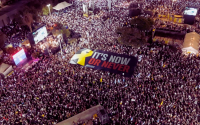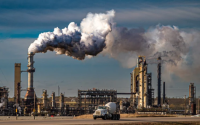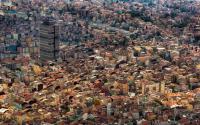24 September 2005Paul Street
I regret being unable to attend the antiwar demonstrations in Washington D.C. today. It's important to make visible large-scale American dissent from the American government's bloody, illegal, immoral, and brazenly imperialist occupation of Iraq.
It is important also for marchers, organizers, and speakers to show that they and other Americans understand the intimate interrelations between American empire abroad and American inequality at home.
The connection between these inseparably linked evils has recently become more evident than anytime in recent memory. Tropical Storm and Societal Failure Katrina (TSSFK) has taken a lid off the nation's steep racial and related socioeconomic disparities in ways that reflect poorly on the nation's commitment to imperial militarism. Large numbers of Americans have been led to reflect anew on the dark absurdity of an unimaginably wealthy society that can't provide reasonably adequate natural disaster protection and relief for many of its poorest citizens while it can sustain a costly and provocative overseas empire of more than 700 military bases and fight an unjust war in Iraq. "Operation Iraqi Freedom" and TSSFK have combined like nothing since the 1960s to suggest the dialectically intertwined nature of what Martin Luther King, Jr. called "the triple evils that are interrelated:" poverty, racism, and militarism. They have combined to give unusual exposure to what King called the "perverted" nature of America's "priorities."
Hurricanes aside, a super-affluent nation that consigns many tens of millions of its citizens to poverty and health insecurity is in no position to export something the Bush administration calls "freedom" to Iraq or anywhere else.
Marchers, reporters, and others seeking signs of that poverty can find abundant evidence in the segregated slums of Washington D.C., which display extreme deprivation within a short cab-ride of America's leading corridors of power. Fittingly enough, the disenfranchised District of Columbia is the most unequal city in the most unequal and wealth-top-heavy nation in the industrialized world.
A nation where the top 1 percent owns more than 40 percent of the wealth and a larger share of the policymakers and politicians is in no position to lecture the Middle East or Latin America on "democracy" and "equality."
A nation where more than a million black children live at less than half the nation's tragically inadequate poverty level while certain citizen-aristocrats spend tens of thousands of dollars on their pets (some even building ostentatious "Palaces for [their] Pooches") has no business lecturing the world on "compassion," "conservative" or otherwise.
A nation that sends masses of children to bed hungry and/or homeless each night while granting outlandish tax cuts and subsidies to the already super-rich has little to tell the rest of the world about fairness and justice.
The repair of "broken societies" (and levees) begins at home, where inequality serves as both taproot and fruit of empire.
I doubt that many of today's marchers labor under the illusion that president Bush will be persuaded of anything positive by their speeches and demonstrations. Bush is a narrow, stubborn, arrogant, and doctrinaire man-child. He's a permanent silver-spoon boy-king who believes that God and History are on his everlasting side come Hell, high water, and/or hurricanes.
Katrina displayed the literal and figurative bankruptcy of regressive neoliberal social policy. For Bush, it has been an opportunity to trumpet standard plutocratic tax-cutting and vapid "free-market" 'entrepreneurialism" as solutions to the hurricane's aftermath.
Just this week, Bush once again shamelessly linked his imperialist war of choice on Iraq to the 9/11 attacks. He gave the American people, the world, and (one might argue) his own sorry 9/11 Commission the finger by equating withdrawal from Iraq with "victory the terrorists." But marches like these shouldn't be about "speaking truth to power." Among other things, they are early preparations for taking power back from those who enjoy illegitimate authority. It's about showing the "powers that be," ourselves, and the world who "We the People" (the alleged masters and beneficiaries of policy under what America's Founding Fathers called "popular government") are. It's about flexing and feeling our collective strength and raising doubts in the hearts and minds of the master class and its assorted power- and Mammon-worshipping officers and agents. It's about systemic disruption, standing down the killing lines, and provoking "elite" responses that help expose the unjust and coercion-based heart of what passes for social order under the rule of empire and inequality.
Marching and speaking against the war aren't themselves the moral and social revolution that King and so many other Americans have long sought, but they are a significant part of the larger struggle. I wish my comrades well today in the streets * their streets * of Washington D.C.
Paul Street ([email protected]) is a writer and historian in DeKalb, IL. His publications include Empire and Inequality: America and the World Since 9/11 (Boulder, CO: Paradigm Publishers, 2004) and the just-released Segregated Schools: Race, Class, and Educational Apartheid in the Post-Civil Rights Era (New York, NY: Routledge, 2005)
http://www.zmag.org/content/print_article.cfm?itemID=8804§ionID=51






